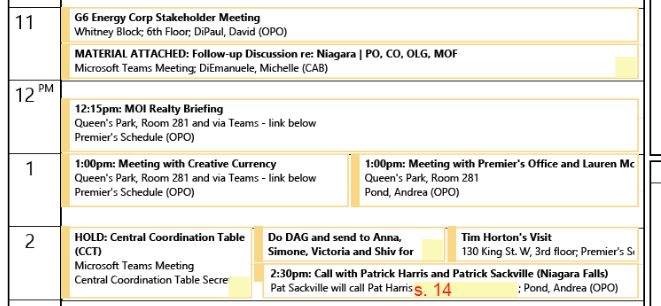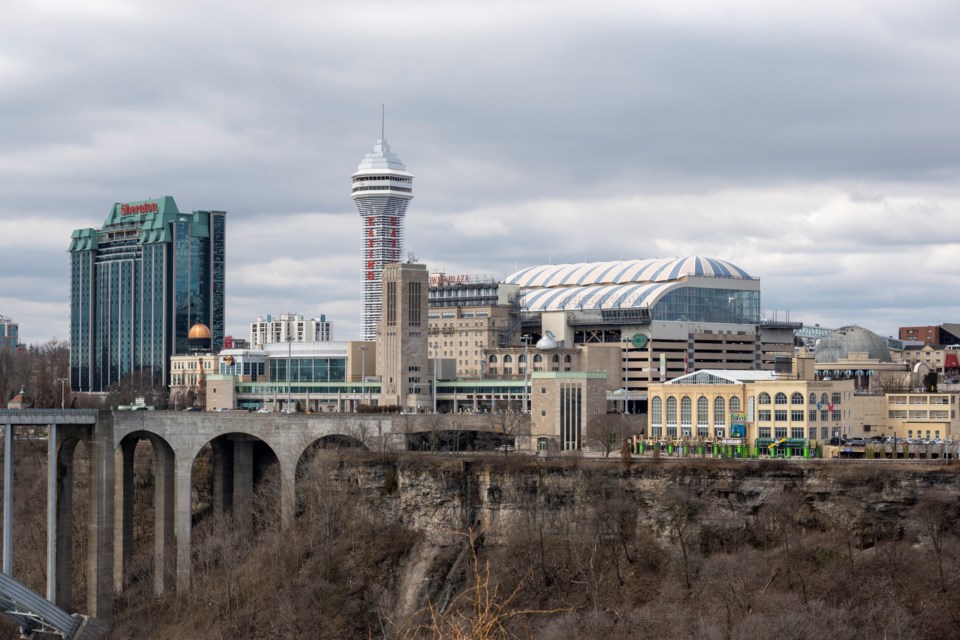Premier Doug Ford’s government is trying to change the deal dictating how casinos in Niagara Falls are run to potentially encourage more to set up shop in the city, according to government records and a well-placed source.
One of the provincial government’s intentions is to help attract more tourists to Niagara Falls and the wider region, the source said. They were promised anonymity by The Trillium because they weren't permitted to discuss what, until now, have been behind-the-scenes negotiations.
Information from the source is supported by various government records received in response to freedom-of-information requests.
Calendars of several senior Ford government officials indicate the existing Niagara Falls casinos-operations deal has been a topic of interest within the premier’s office over the last year-and-a-half-plus.
Also in May, three separate “negotiations update(s)” about a “Niagara Destination Strategy” were prepared for the deputy finance minister’s office, the ministry disclosed in response to a freedom-of-information request.
Six years ago, Mohegan Gaming and Entertainment (MGE) signed an agreement with the Ontario Lottery and Gaming Corp. (OLG) to make it the operator of casinos in Niagara until 2040.
An OLG spokesperson, Tony Bitonti, wrote in an email, “To respect commercial confidentiality, OLG does not comment on any discussions with any of its casino service providers.”
Before this story's publication, spokespeople for the offices of the premier and the cabinet minister responsible for the OLG hadn't responded to questions emailed to them about negotiations of the Niagara casinos deal. Neither did a spokesperson for Mohegan.
OLG manages lotteries and casinos in Ontario. It forwards roughly $2.5 billion each year to the provincial government to put toward services, like health care or education, as examples. Casinos are the OLG's most lucrative business and generate most of the revenue it provides the province.
OLG also shares revenues with municipalities that host casinos. Its spokesperson said Niagara Falls, as host to two casinos — Fallsview Casino Resort and Casino Niagara — has received more than $200 million from OLG since 1994.
Beginning in the early 2010s, while the Liberals were in power, Ontario's government embarked on a “modernization plan” for OLG. It included outsourcing day-to-day operations of Ontario’s casinos, in regional bundles, to private companies to leverage their willingness to make capital investments to keep OLG costs low while allowing for their revenues to continue benefiting the public.
On Sept. 10, 2018, OLG announced Mohegan would take over running the day-to-day operations of the Niagara casinos beginning the next summer.
A roll of the dice
Ontario’s auditor general, in a 2022 audit, found Mohegan’s two competing bidders for the Niagara casinos operating contract proposed “significantly higher gaming revenues … (and) significantly more direct capital investment.” Capital spending Mohegan proposed was “50 per cent lower than what would have maximized revenues,” said the report by the auditor, whose office also found that bidders’ capital investments weren’t weighed in the OLG's evaluation criteria.
Mohegan’s proposal offered the highest guaranteed minimum revenue commitments over the first 10 years, which the OLG’s scoring system prioritized, the auditor general found.
OLG and the City of Niagara Falls, however, weren’t aligned on what would best benefit the municipality, according to the auditor general’s 2022 findings. Its report recounted how the Crown corporation said Niagara Falls would benefit most by profits being maximized through the two existing casinos being maintained. The city, meanwhile, told the auditor’s office it “would prefer an operator willing to make the greatest non-gaming capital investments to increase tourism to the region,” according to the report.
Jim Diodati has been mayor of Niagara Falls since 2010 and is a political ally of Ford's PCs. As mayor, he's been a big proponent of the city's reputation as a gambling destination. “Let’s bring in a third casino with a private operator," Diodati said in 2013, according to reporting by CHCH. "A third operator, but cater to the high end that will build a high-end resort.”
A spokesperson of Diodati's who The Trillium spoke to on Tuesday also hadn't responded to a request for an interview with the mayor before this story was published.
One year into Mohegan running the Niagara casinos, OLG decreased how much revenue it projected they’d bring in by 13 per cent, according to the auditor general's 2022 report.
The COVID-19 pandemic began around the same time. Being heavily reliant on tourism, Niagara Falls’ economy was hit especially hard. In 2021, its hotel occupancy rate plummeted to 32.5 per cent, a level "significantly lower than pre-pandemic ... and the provincial average of 44.1 per cent" that year, according to a Ministry of Tourism document.
Making their own luck
As the pandemic waned, the Ford government made a point of promising its support for the recovery of Niagara Falls’ tourism industry. “Development in the region will play to Niagara’s competitive advantages, diversify the tourist experience, and offer unique reasons to visit and extend stays,” its 2022 budget said.
By late 2022, the Niagara casinos deal had become a topic of interest within the premier's office, according to government records The Trillium obtained using the freedom-of-information system.
On Oct. 20, 2022, a copy of the daily calendar kept by one of Ford’s senior staffers, Patrick Sackville, noted a briefing was planned for some premier's office staff for an “Update on Niagara COSAs.” Casino operating and services agreements (COSAs) are the 20-year deals OLG signed with operators to run the province’s casinos, bundled in regions.
Calendars of Ford, multiple senior premier’s office staffers, and a few cabinet ministers from 2023 and 2024 that The Trillium obtained contain dozens of Niagara-related meetings and other entries. Some represent meetings about Niagara casinos. Some are focused on other topics, including the increase in GO Rail service to the region or the $3.6-billion South Niagara Hospital that the government began building last year. The purpose of others are unclear.
A couple of weeks apart in late March and early April 2023, a few of Ford’s staffers’ calendars show officials in the premier’s office, Cabinet Office, OLG and Ministry of Finance had scheduled “Niagara” discussions.
The latter discussion was on April 6, 2023. On the same date, Sackville's and his assistant's calendars showed he also planned to call a longtime lobbyist for one of the Niagara casinos. Sackville had been promoted to Ford's chief of staff by then. Copies of his and his assistant's calendars from April 13, 2023 and June 1, 2023 show near-identical entries noting calls with the lobbyist, Patrick Harris, about "Niagara" on those dates as well.

The active lobbying registration by Harris, a managing partner of Rubicon Strategy, on behalf of Canadian Niagara Hotels Inc. says his goals include “engaging with government to develop a long-term tourism and growth strategy for the Niagara region … including economic development (and) infrastructure … (and) monitoring the ongoing policies and regulations the government is considering regarding … land-based gaming.”
Before this story’s publication, Harris hadn’t responded to questions The Trillium emailed him about the calls shown in Sackville’s and his assistant’s calendars. Ford's office's spokesperson also hadn't confirmed or denied whether Niagara-related meetings and calls logged in premier's office officials' calendars ultimately took place as planned.
On April 27, 2023, Ford, Sackville, a few other senior premier’s office staffers and cabinet secretary Michelle DiEmanuele, Ontario’s highest-ranking civil servant, had a 30-minute meeting planned for a “Niagara Update,” according to the premier’s detailed itinerary from that date.
Some Niagara-focused meetings involving OLG officials in the past year are described in premier's office staffers' calendars as being about a "Niagara Destination Strategy."
OLG had reported to the finance minister until early this June. Using a freedom-of-information request, The Trillium requested various types of records prepared in May for the finance minister’s or deputy finance minister’s office about the “Niagara Destination Strategy.” In total, 14 records consisting of 129 pages were found to be relevant to the request, the Ministry of Finance's decision letter said. Three records, including four pages apiece, were described as separate “negotiations update(s).” None of the 129 pages could be released, the Finance Ministry decided.
Sections of Ontario’s Freedom of Information and Protection of Privacy Act allow for records to be kept from being disclosed under certain circumstances. In its decision, the ministry applied parts of the act allowing it to maintain the secrecy of Cabinet records, advice given to the government, third-party information, and information to protect Ontario’s economic interests.
As part of his cabinet shuffle this June 6, Ford created a new portfolio: a minister of tourism, culture and gaming, which Stan Cho was appointed by the premier, assuming responsibility for the OLG.
Finance Minister Peter Bethlenfalvy declined to answer questions The Trillium asked him last week about the OLG-Mohegan agreement, saying “it’s been a couple of months since I looked at that file,” and that Cho’s office would be better suited to answer questions about it. The minister of tourism, culture and gaming's spokesperson didn't respond to questions emailed to them before publication of this story.




